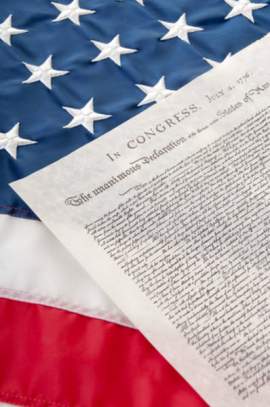
Who Are The Founding Fathers

Popular In Constitution
Purpose Of Lifetime Appointment And Pros And Cons Enumerated Powers Bicameral Legislature Background Article 3 Of The Constitution We The People 1st Amendment Who Wrote The Constitution Judicial Review Equal Protection Clause 5th Amendment 10th Amendment Three Fifths Compromise
Background
The Founding Fathers were a group of prominent American colonialists, responsible for the creation of the U.S Constitution and Declaration of Independence. The Founding Fathers of America were various statesmen, politicians, intellects, and authors. They were renaissance men of sorts, responsible for a multitude of societal contributions. The American Revolution, sparked by unjust taxation and a suffocating British Parliament, was intensified through the teachings and influence of such men. Although their methods and political thoughts varied, the Founding Fathers all contributed in the unification of America and the subsequent formation of a balanced governing system. Following the Revolutionary War the country needed to adopt a doctrine that would organize and balance the powers of a newly formed government. An arduous task, indeed, the Founding Fathers eventually reached a compromise that distributed powers between the individual colonialist, the Federal Government, and the states.
Alexander Hamilton
A respected leader of the Federalist Party, Alexander Hamilton viewed an empowered central government as the means to a functional society. Hamilton was a cynic at heart. He distrusted individuals from making aggregate decisions. Although coming off a Revolution against an authoritative rule, Hamilton believed that an empowered central government was necessary to properly administer adequate taxation, foreign policy, and legal systems. Faced with anti-Federalist opposition, Hamilton gathered his fellow supporters and produced a series of publications known as the Federalist Papers. The collection of 85 essays was aimed to educate the masses as well as spark Federalist momentum.
The Federalist Papers, by revealing the connotation of the Constitution, aimed to ratify the legislative document and further empower the Federal Government. Hamilton and his fellow peers were disgusted by the separation of powers outlined in the original context. Too much power was awarded to the states, the country became fragmented, and the taxation/legal system was completely inept. Hamilton and his prominent counterparts eventually reached a compromise: power was awarded to the Federal Government to tax and enforce laws, but the states and individuals also enjoyed various liberties and voting privileges.
Thomas Jefferson
A Summary View of the Rights of British America, Jefferson's first published work, attacked the British rule as a direct violation against human rights. Jefferson's thesis and overwhelming ideology revolved around the basic rights of man and the direct attempt by the Parliament to impede such liberties. Following the outbreak of the Revolutionary War Congress appointed a five man committee to author the Declaration of Independence. As a result of his literary genius, Jefferson authored the historical document and quickly became regarded as a thought-provoking leader for the establishment of human rights. During the Constitutional Convention, Jefferson was abroad serving as a diplomat. Although absent, his viewpoints and desire for the inclusion of individual rights were expressed through the Anti-Federalist Party.
Thomas Paine
In Common Sense, Thomas Paine successfully ignited and augmented anti-British sentiments that aided in fueling the American Revolution. Referred to as the "Father of the American Revolution", Paine effectively spread the thoughts of Republicanism and boosted enthusiasm for American sovereignty. Common Sense separated itself from other anti-British literature. The pamphlet used concise writing to which the average colonialist could relate. Through his writing, Paine offered American settlers an ultimatum: fight for your freedom or take a risk and live life under a dominating and tyrannous British government.
Common Sense was a rallying cry for the American Revolution. The book was read out loud in local taverns and to militiamen eager to fight the British forces. Although seen as a radical, Thomas Paine's influence towards sparking a revolution cannot be questioned.
NEXT: George Mason





















